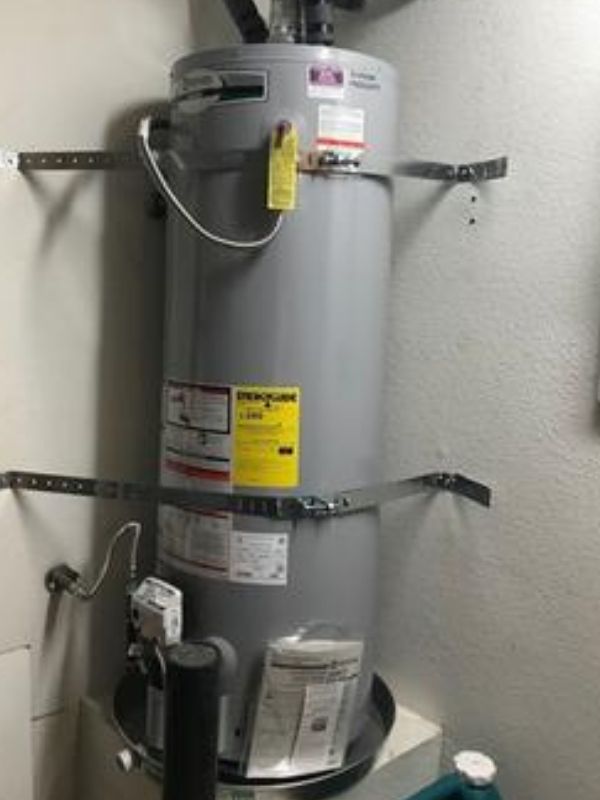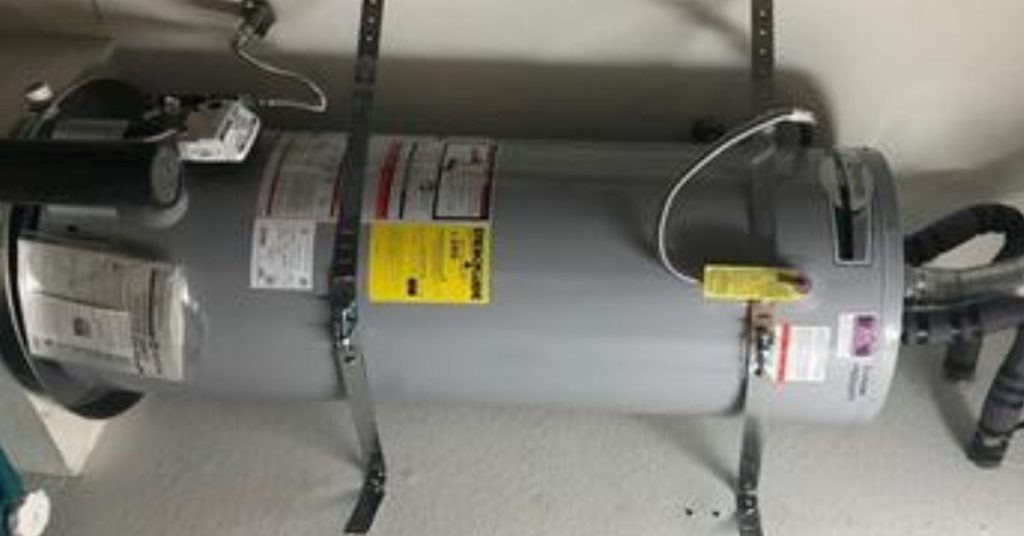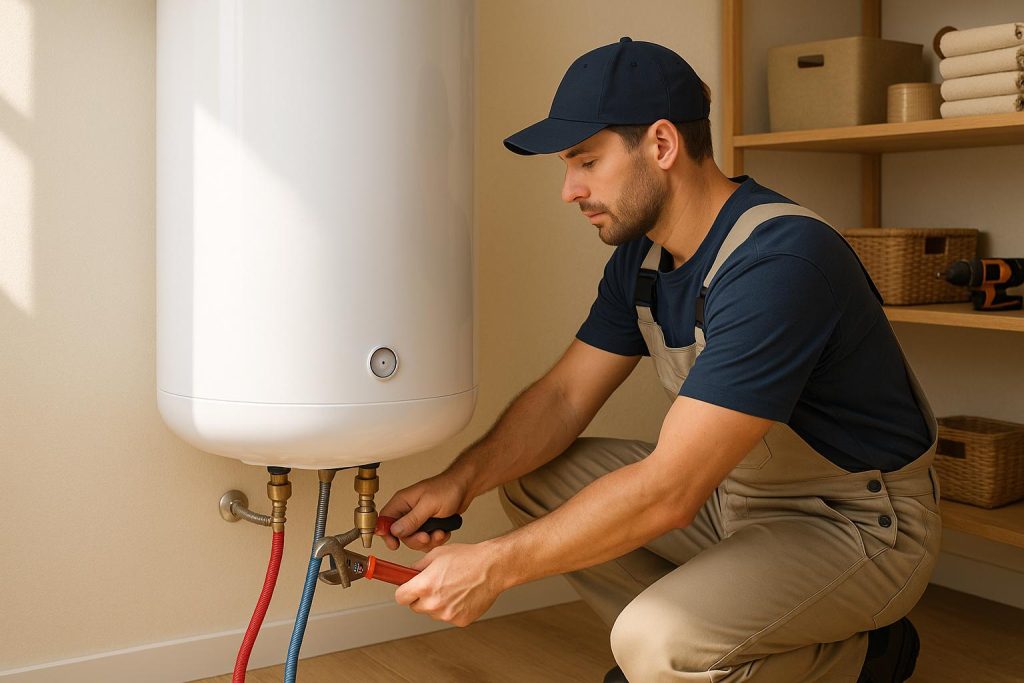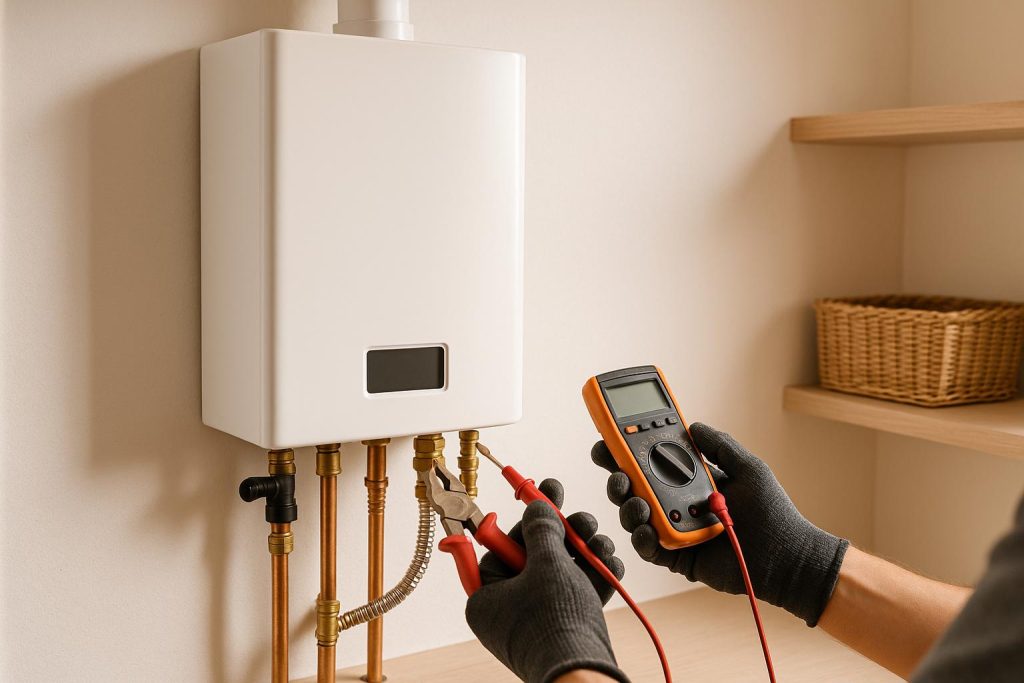The average water heater will last for 10-15 years. However, this is dependent on how well you take care of it and how much it’s been used.
Here’s 5 signs that it’s about time to start saving for a replacement water heater:

You might be wondering: when do I know if you need a new water heater?
- Age: If your water heater is 10-15 years old, you may need to start planning for its replacement. Again, most last this long, but you never know.
- No hot water: Hot water problems? Might be a sign that it will need to be repaired or replaced.
- Leaks: A water heater leaking, especially from the bottom will need to be replaced as soon as possible.
- Rusty water: Rusty hot water means that the water heater needs to be flushed or replaced.
- Unusual noises: Banging, popping or rumbling sounds from the water heater are a sign of sediment buildup, which lowers its volume and efficiency.
- High energy bills: An old and inefficient water heater works harder than usual to try and heat water and hence the high energy bills.
Still need help? Get a free quote from a local plumbing pro in your area
1. The Water Heater is Old
Water heaters are made by different manufacturers and as such are of different qualities. The sad truth however is that even the best water heater will one day need a replacement. No matter how well you take care of it.
So, how long do/should water heaters last? And how do you know the age of your current water heater, especially if you moved into the house not too long ago?
The average lifespan of an electric water heater is 10 years. Some may however need a replacement after only 8 years while some may last for up to 15 years. Gas-heated water heaters last for about 6 to 8 years.
Do I Have an Electric or Gas water heater?
To know if you have a gas or electric water heater, make your way to the basement or wherever your water heater is located and have a look at what goes in and out of the tank. Also, look at the tank’s body.
If you see a pipe (usually ½ inch black) connected to the bottom of the tank, you have a gas water heater. On the other hand, if you see an electric cord connected to the side or top of the tank then you have an electric water heater.
Alternatively, open the access panel on the side of the tank and observe inside. If you see a blue flame (pilot light) your water heater is running on natural gas.
How Old Is My Water Heater?
After knowing the type of water you have, the next thing to find out is your water heater’s age. This will help you know if it needs a replacement or if a repair will suffice.
There is a data sticker/label on the side of your data plate. On that sticker, you will find your water heater’s date of manufacture. If the water heater is more than 10 years old you should definitely consider replacing it.
Some manufacturers make it easy for you to know the actual date the water heater was made. They will write the date clearly on the label just as everyone else writes dates. Something like DEC 2014.
Some don’t. They use a code instead. The code also serves as the heater’s serial number. If you don’t know how to read the code you might not be in a position to determine the age of your water heater.
If for instance, the serial number of a water heater is B149896741, it means that the water heater was manufactured in February 2014. How did I arrive at that?
The first letter of the serial number represents the month that the water heater was manufactured. A represents January, B represents February, C March, all the way to the month of December.
The first 2 numbers represent the last 2 digits of the water heater’s year of manufacture. In this case, the first 2 numbers are 14 meaning the heater was manufactured in 2014.
Here are more examples:
- A096789765 – January 2009
- F187856431 – June 2018
2. Rusty Water in the House

When you notice rusty water (water with a brownish discoloration) coming from your faucets it means that:
- Your house has old steel pipes which are badly corroded.
- The interior of your water heater is very corroded.
- You water heater tank has a high accumulation of rust/pipe corrosions and mineral deposits, especially iron.
The first thing to do when you notice rusty water coming from your faucets is to determine if it is coming from your house plumbing or from the municipal water or even the well for those who use water from a well. To do this open both the cold water and hot water faucets in one of your sinks.
If the reddish-brown water appears in both faucets then the problem has nothing to do with your water heater. On the other hand if the rusty water appears to only come from the hot water faucet then most likely the water heater is the problem.
The next thing to do is to flush your water heater tank. By so doing, you will be in position to know if the rust is coming from the house pipes, water heater corrosions or there is a rust accumulation inside the water heater tank.
Water heater tanks are usually made of steel. While steel is a tough metal, it usually have 2 enemies. Water and oxygen. Steel reacts with oxygen in the presence of water to form a reddish-brown substance called rust.
Because of that problem, water heater manufacturers usually manufacturer water heaters with a glass lining inside of the tank to prevent the tank body from coming into contact with the water.
With time however, the glass lining deteriorates/peels off creating the perfect condition for rust to form inside the tank. The thing about rust is that it eats away the steel, something that weakens the tank which affects its pressure integrity.
Apart from the rust, the steel tank is always hot. And what do we know about hot surfaces? They expand. The expansion and contraction of the water tank is nothing to worry about on its own but when you add rust it becomes a potential hazard.
If you really want to know if the reason you are having rusty water in house is due to a bad water heater or corroded supply pipes you will have to drain and flush the water heater.
How to Drain a Water Heater
- Turn off the cold water supply to the heater.
- Turn off the water heater. If you are using a natural gas water heater turn off the thermostat to the pilot light. For an electric water heater, locate the circuit breaker and flip the water heater power supply “OFF”. Leaving an electric element on while draining the tank can cause it to burn.
- Open a hot water faucet. Locate the closest hot water faucet and open it. This way the tank drains faster.
- Attach a garden hose to the water heaters drain valve, located at the bottom of the tank. Put the other end of the hose in a floor drain, sink or out in the driveway. Just be sure the hot water will not come in contact with anyone.
- Open the drain valve and allow the water to drain.
- Once the tank is empty, turn on the water heater’s cold water supply to further flush out any remaining sediments. Do this until only cleaning water is flowing out.
- Turn off cold water to the water heater, turn off the drain valve and then turn on the water heater cold water supply to refill it. Close the hot water faucet as well.
- Now turn on power to the heater.
If while draining the water heater you saw the rusty water discoloration, you have been seeing in your faucets, then the problem is with the heater and not the pipes. It could be that the heater is not that badly off but the rust is just sediment from outside your home.
If the water heater is not older than 8 years and is not exhibiting any other signs, you might hold onto it, unless the problem persists. Otherwise go ahead and replace it.
3. Noises From the Water Heater
A properly function water heater should not make any sound, apart from the usual (almost unnoticeable) sound of water heating up or refilling. Any other sounds apart from those is a telltale sign that things are not good inside the water heater.
One of the causes of knocking sounds inside a water heater is sediment/mineral deposits. After years of usage, sediments/mineral deposits will settle at the bottom of the water heater tank reducing the tank’s volume.
The rattling/knocking/popping sound is caused by steam bubbles trapped inside the tank. Due to the reduced volume of water at the bottom of the tank, steam bubbles start to raise as the water is heated. This bubbles are trapped inside the tank created the rumbling/rattling sound.
Apart from the sound, sediments will considerably lower the efficiency of the water heater, take longer to heat water, as well as lower its lifespan. The extra time that the heater takes to heat water means the tank is expanding even further which affects its structural integrity.
This problem is especially prevalent in areas with hard water. The mineral deposits settle and harden at the bottom of the tank, wearing out the tank lining. The tank’s corrosions (small particles) are also responsible for creating knocking sounds inside the heater.
As the water is being heated, it is always in motion, and as a result layers of the sediment move up and down creating the knocking sounds.
If your rumbling water heater is more than 8 years old, you should definitely consider replacing it sooner. For a relatively newer water heater try to drain it as see if the rumbling stops. It is always advisable to drain your water heater frequently.
4. Water Heater Is Leaking

Of all the problems associated with water heaters, a leaking water heater is not something you want to have. Here is why:
- A leaking water heater is an expensive things to have – If your water heater is leaking, it means water will be continuously flowing into the tank and at the same time the burner will be on for longer. You will therefore pay more in water bills and power bills.
- Destruction of property – Unless your water burner is in the basement, a leaking water heater will destroy floors (especially if it is wooden), destroy wooden accessories, soak carpets/rags, books and magazines.
- Health hazard – Hot water on the floor could badly scald your feet. It is especially risky if you have little children running round in the house.
Not all leaks are dangerous and need the water heater to be replaced though. This will depend on where the leak is coming from.
If the leak is coming from the tank itself, it will need to be replaced. This mostly happen at the bottom of the tank because the sediment there eats away the tank material creating a tiny hole which may expand with time.
Leaks can also occur at:
- The drain valve. If the drain valve is the only place leaking, you are lucky. Drain the water heater and replace the drain valve.
- The pipe connections. If you have traced the leak to either the cold or hot water inlet and outlet valves, grab a wrench and tighten the connections. You should not forget to drain the tank and hot water lines prior. If the threads are worn out replace that particular pipe/fittings.
- The pressure and temperature relief valve. The temperature and pressure relief valve is a safety valve that drains a little water from the inside of the tank if the pressure and temperature is too high. If water is dripping from the pressure and temperature relief valve, it could just be doing its job or it could be faulty. It is hard for you to figure this out on your own. More information here
In short, you should replace your water heater (immediately) if the leak is coming directly from the tank. Other leaks can be fixed, as long as the unit is not too old.
5. Water Heater Not Heating
If you open a hot water faucet in your house and notice that only cold water is flowing out, the first thing you should do is to determine if the problem is affecting that one appliance or the whole house.
Open other faucets in the house to find out. If the problem is all over the house, you most definitely have a problem with your water heater. On the other hand if the problem is affecting only one appliance, say the shower faucet, you are dealing with a defective mixing valve or you could be living in an old house with cross-connected pipes.
A shower mixing valve is a valve installed at the junction of where cold water and hot water pipes meet, to prevent cross-connection. A faulty mixing valve will cause the hot water to push back cold water in the cold water lines hence cold water in the faucets.
In houses which were built before mixing valves were a thing and have not been remodeled, cross-connected pipes will most definitely prevent hot water from flowing out of your faucet. This is a problem you will need to call a plumber to fix.
Why Is My Water Heater Not Working?
There are 3 things that you will notice from a faulty water heater:
- The hot water does not last long – If the hot water in your house gets depleted very first, you most likely have sediment sitting at the bottom of your water heater tank. The sediment reduces the capacity of the tank and that is why the reason the hot water runs out pretty quickly.
- The hot water is not hot enough.
- The water is all cold
If the water in your house is not hot at all or not hot enough, there are some checks you can perform before deciding to replace the water heater. Dah to where the water heater is located and check out the following things:
- The first thing is to make sure that there is no leaks on the floor.
- If you have a natural gas water also make sure that the status light is blinking on the control panel. This panel is usually located at the bottom of the tank where the gas pipe enters the water heater.
- You will also see a panel (metallic) at the bottom of the tank. This panel conceals the burner. You will see a small sight glass. Look through this sight glass to see if the pilot is lit.
- If the pilot is not lit there are so many causes for it and you are better off calling a plumber to fix it.
- If the pilot is lit, check the settings on your thermostat. They could have been accidentally set too low. The ideal thermostat settings should be between 120 and 140 degrees Fahrenheit.
- If the temperature does not improve after adjusting the thermostat, you should replace the thermostat.
Another problem could be a broken dip tube. Water heater dip tube is the piece which incoming cold water enters the heater.
In a properly functioning water heater, the dip tube delivers cold water to the bottom of the heater where it is heated properly. If the dip tube is broken, it shoots cold water at the top of the heater. Coincidentally, the hot water supply valve from the heater is also at the top of the tank. It is therefore possible that cold water will flow through your hot water pipe.
Again, if your heater is older than 10 years and you start experiencing these heating issues, you are better off replacing it. Otherwise you will become your plumber’s cash cow.
For more information check out this post.
6. More People in the House
Have you ever been the last person to shower in a large household? If your answer is in the affirmative then you know that getting hot water in the shower is close to impossible. There are 2 things you can do in that case:
- Buy a bigger water heater.
- Install an on-demand/tankless water heater.
Tank vs Tankless Water Heaters
A tank water heater is what is found in most Americans home. A water heater that with a tank of a fixed volume heated by natural gas or electricity. This system is however not in use in most of the other first world countries.
The problem with tank water heaters is that they limit the amount of water you can use and if depleted you have to wait for about 30 minutes for the water to get hot.
Tankless water heaters which are also known as on-demand water heaters or instant water heaters provide you with endless supply of hot water day and night.
Another benefit of tankless water heaters is that they are wall-mounted hence freeing up valuable space for you in the house. I would choose tankless water heaters over tank water heaters any time. This is what folks in Europe and Asia use.
Tankless Water Heaters to Consider.
So what is the best tankless water heater? I will give you 2 options to choose from. One is electric while the other is gas run.
The 2 best on-demand water heaters are:
1. Stiebel Eltron Tankless Water Heater
- A maximum of 4 gallons per minute
- 99% efficiency rating
- Electric
- 7-year leakage and 3-year part warranty.
2. Rinnai RUR199IP Tankless Water Heater
- A maximum of 11 gallons per minute
- 96% efficiency
- Natural gas
- 12-year warranty on heat exchanger, 5-year warranty on parts
Conclusion
In summary, you should replace your water heater if:
- It is older than 10 years.
- It is making a rumbling noise.
- The water is rusty
- It is not heating water
- There are more people in the house
- It is leaking
- An increase in energy bills
Still need help? You can always get a free, non committal quote from a local plumbing pro here.






